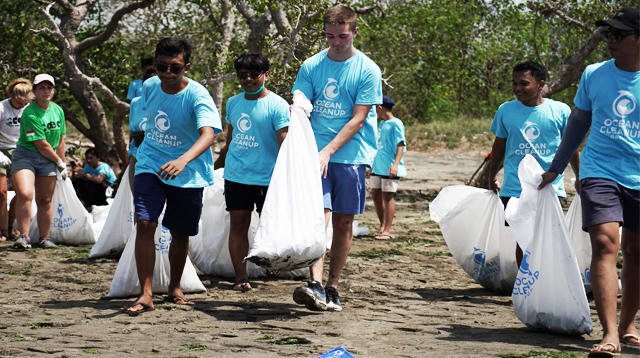NOWADAYS plastic waste has become a problem everywhere including in Bali. A lot of plastic waste is disposed to landfills, carried by seawater or river water until it strands along the beach. The plastic waste in the ocean has harmful impacts on the life of fish or turtles tangled up by plastic. Or mangrove trees die because their breath roots are covered with plastic waste.
In addition, paddy fields of farmers are also flooded with Bali plastic waste when it rains. By and large, first lot of paddy field directly connecting to water irrigation channel looks chaotic as plastic waste is scattered at every side. This happens because many upstream communities still throw their plastic waste into rivers or water irrigation channels.
In response to this situation, the Governor of Bali Wayan Koster issued Pergub No.97/2018 which limits the generation of single-use plastic waste. This is the governor’s commitment after being elected and in line with the vision of Sat Kertih Loka Bali to go through a planned universal development pattern towards a new era of Bali.
With this regulation, all parties are obliged to comply with and implement the entire contents of this Gubernatorial Regulation in order to maintain the sanctity and harmony of Bali’s nature along with its contents accordingly.
The regulation on disposable plastic bag prohibition is supported by many parties, from the central government to environmental activists. This rule is considered very relevant so that nature becomes cleaner and free from plastic waste pollution.
This Gubernatorial Regulation is also supported by other regulations on waste management. With this rule, the Bali plastic waste problem will be resolved from the upstream so that they do not accumulate in landfills. Customary villages are also involved in processing the waste by separating it based on organic and inorganic portion. So, the waste disposed to landfills will be getting less and less. There is also waste bank where people bring recyclable plastic waste to the bank and its selling money is transferred into saving. In short, people can get benefit what they must dispose.
Similarly, the regulation has been disseminated to the public, especially to traditional markets and supermarkets considered as the biggest generators of plastic waste because they provide plastic shopping bag. With the issuance of the regulation, people have to bring their own shopping bags from home. Merchants or supermarkets no longer give plastic bags to visitors. If consumers don’t have them, they can buy a cloth shopping tote bag that can be used over and over again.
Plastic waste is produced by various sources such as households, industry, community groups, hospitals, schools, markets and everywhere. With the new regulation, later on those who produce waste are obliged to manage it independently through multilevel Bali plastic waste management.
As the saying goes, where there is a problem there is an opportunity. The problem of banning single-use plastics will certainly be able to grow new creative industries for Balinese citizens. Now, there are many new creative industries that produce eco-friendly products, such as the straws, plates, spoons, bags, wooden food boxes and so forth made from non-plastic materials.










